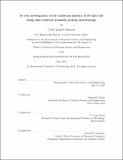In-situ investigation of the oxidation kinetics of Fe-12Cr-2Si using time-resolved transient grating spectroscopy
Author(s)
Dennett, Cody Andrew
DownloadFull printable version (11.31Mb)
Other Contributors
Massachusetts Institute of Technology. Department of Materials Science and Engineering.
Advisor
Michael P. Short.
Terms of use
Metadata
Show full item recordAbstract
The design and validation of new alloys for engineering applications is limited by the speed at which materials may be tested. In particular, there exist few methods by which the thermal, mechanical, and structural properties of materials may be monitored in conditions that are dynamically changing their microstructure. These conditions, such as heat treatments, radiation exposure, or corrosive environments, are common when material performance needs to be validated. To offset this lack of capability, new non-destructive experimental tools must be developed to facilitate on-line, realtime testing of materials undergoing some type of evolution. In this thesis, a flexible, all-optical methodology known as dual heterodyne phase collection transient grating spectroscopy is developed for this purpose. This method adapts a traditional spectroscopic technique sensitive to thermal and mechanical properties for real-time use. A formalism is also developed to quantify both elastic and thermal transport properties of materials with second-scale resolution. These new tools are then used to study the short-timescale oxidation kinetics of Fe-12Cr-2Si, a model alloy with oxide layer formation properties similar to large classes of Fr-Cr alloys. By monitoring the effect of thin oxide layers on surface thermal transport, there exists a pathway to continuously determine the thickness of a tens of nanometers thick growing oxide layer in real-time. Despite the lack of clarity in the particular set of experimental results presented here, the potential for the methods developed in this thesis is large. In-situ materials testing of this type may allow for a drastic increase in the pace of materials development by reducing the need for post-evolution, destructive materials testing between each design iteration.
Description
Thesis: S.M., Massachusetts Institute of Technology, Department of Materials Science and Engineering, 2017. This electronic version was submitted by the student author. The certified thesis is available in the Institute Archives and Special Collections. Cataloged from student-submitted PDF version of thesis. Includes bibliographical references (pages 95-99).
Date issued
2017Department
Massachusetts Institute of Technology. Department of Materials Science and EngineeringPublisher
Massachusetts Institute of Technology
Keywords
Materials Science and Engineering.